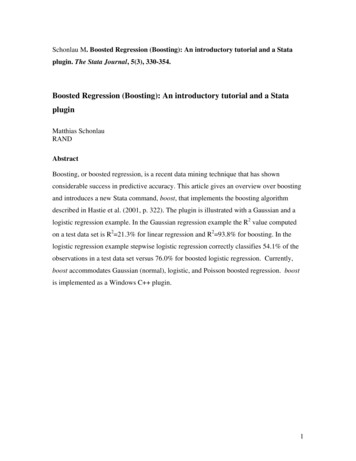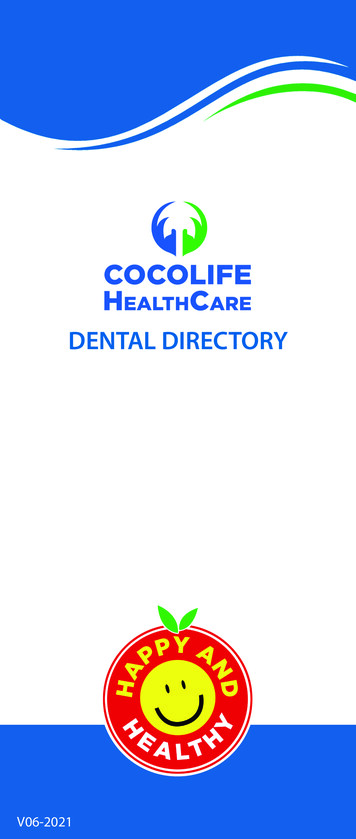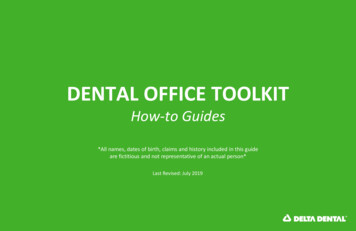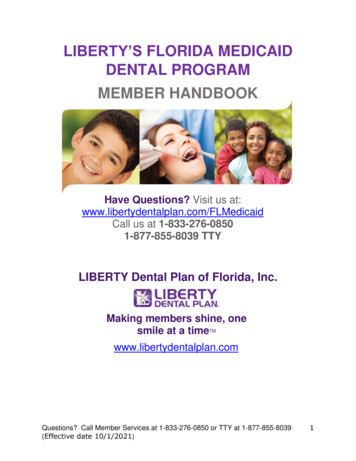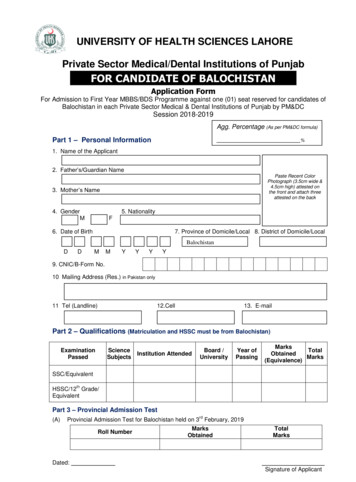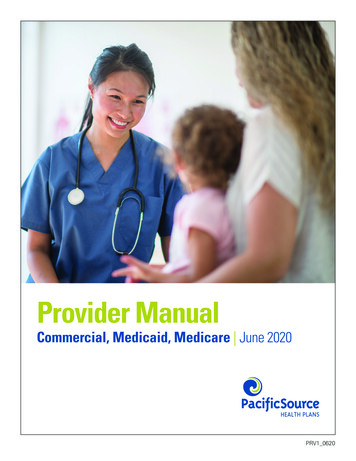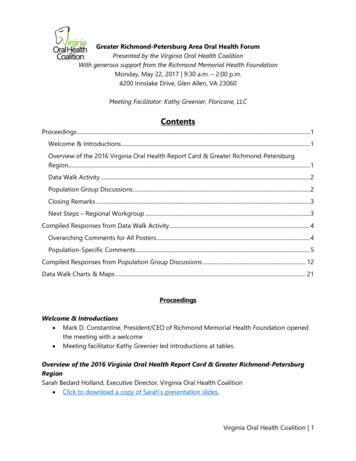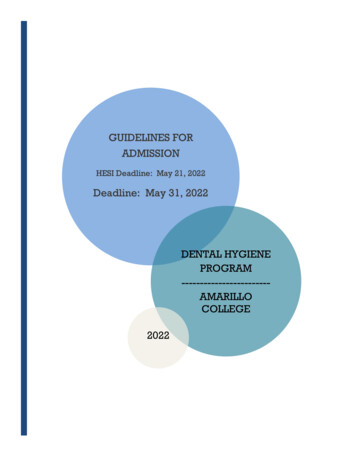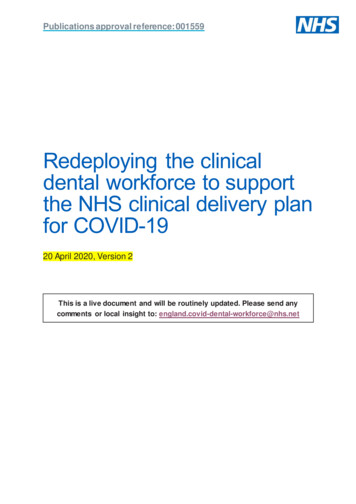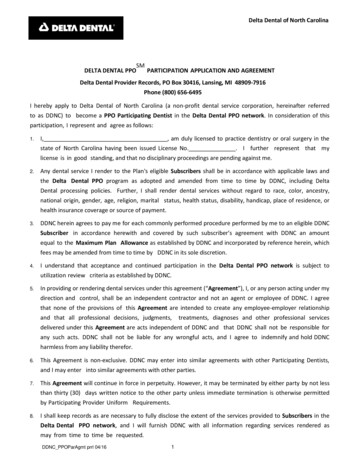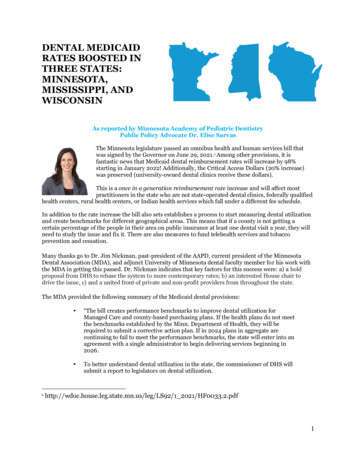
Transcription
DENTAL MEDICAIDRATES BOOSTED INTHREE STATES:MINNESOTA,MISSISSIPPI, ANDWISCONSINAs reported by Minnesota Academy of Pediatric DentistryPublic Policy Advocate Dr. Elise SarvasThe Minnesota legislature passed an omnibus health and human services bill thatwas signed by the Governor on June 29, 2021. 1 Among other provisions, it isfantastic news that Medicaid dental reimbursement rates will increase by 98%starting in January 2022! Additionally, the Critical Access Dollars (20% increase)was preserved (university-owned dental clinics receive these dollars).This is a once in a generation reimbursement rate increase and will affect mostpractitioners in the state who are not state-operated dental clinics, federally qualifiedhealth centers, rural health centers, or Indian health services which fall under a different fee schedule.In addition to the rate increase the bill also sets establishes a process to start measuring dental utilizationand create benchmarks for different geographical areas. This means that if a county is not getting acertain percentage of the people in their area on public insurance at least one dental visit a year, they willneed to study the issue and fix it. There are also measures to fund telehealth services and tobaccoprevention and cessation.Many thanks go to Dr. Jim Nickman, past-president of the AAPD, current president of the MinnesotaDental Association (MDA), and adjunct University of Minnesota dental faculty member for his work withthe MDA in getting this passed. Dr. Nickman indicates that key factors for this success were: a) a boldproposal from DHS to rebase the system to more contemporary rates; b) an interested House chair todrive the issue, c) and a united front of private and non-profit providers from throughout the state.The MDA provided the following summary of the Medicaid dental provisions: “The bill creates performance benchmarks to improve dental utilization forManaged Care and county-based purchasing plans. If the health plans do not meetthe benchmarks established by the Minn. Department of Health, they will berequired to submit a corrective action plan. If in 2024 plans in aggregate arecontinuing to fail to meet the performance benchmarks, the state will enter into anagreement with a single administrator to begin delivering services beginning in2026. To better understand dental utilization in the state, the commissioner of DHS willsubmit a report to legislators on dental utilization.1 http://wdoc.house.leg.state.mn.us/leg/LS92/1 2021/HF0033.2.pdf1
The legislation requires a uniform dental credentialing process beginning January1, 2022. The legislation does eliminate the rural, children, and community clinic add-onand reinvests those dollars into an across-the-board rate increase. The legislation expands Medicaid to cover nonsurgical treatment for periodontaldisease for adults including scaling and root planing once every two years for eachquadrant, and routine periodontal maintenance procedures. Each year the commissioner of DHS will submit a report to legislators on providerreimbursement rates, in order to improve transparency. The legislation establishes a dental home advisory committee that willrequire DSAC (dental services advisory committee), in collaboration with specificstakeholders, to design a dental home demonstration project and present therecommendations by February 1, 2022. The advisory committee will include arepresentative from the Minnesota Dental Association and two private practicedentists. The commissioner of DHS shall present recommendations on dental rate rebasingto legislators by February 1, 2022. The report must include recommendations onthe frequency of rebasing, whether it should incorporate an inflation factor, andother factors relevant to ensuring access to dental care. The commissioner of DHS will review other states that have implemented a carveout model and switched to a single administrator and compare programs.”As reported by Mississippi Academy of Pediatric DentistryPublic Policy Advocate Dr. Neva EklundIn 2020, the Mississippi Academy of Pediatric Dentistry (MAPD) engaged a state-levellobbying firm to work on Medicaid issues before the state legislature and generalanesthesia issues before the state dental board. Typically, in every third Mississippilegislative session Medicaid is up for reauthorization. MAPD’s focus was on increaseddental fees and greater accountability for managed care organizations (MCOs). In 2021progress was made via changes the legislature made to remove the automatic 5%administrative withholding on reimbursement rates, and approve a 5% increase inpreventive and diagnostic fees for each fiscal year 2022, 2023, and 2024. MAPD alsoassisted the Mississippi dental board in re-vamping their anesthesia regulation toensure safer measures are in place for Mississippi children under anesthesia during dental procedures.MAPD President Dr. Tiffany Green sent the following message to chapter members:“Mississippi Academy of Pediatric Dentistry owes a huge thank you to Clare Hester, Erin Nail andthe entire team at Capitol Resources, LLC. I am a firm believer that NONE of the above thingswould have been accomplished without our partnership. They have led and directed us, foughtfor our interests and the safety of the children of Mississippi, connected and established valuablerelationships with legislators and state agencies, and opened doors and helped us gain respectfrom Mr. Drew Snyder and the Department of Medicaid. They have kept your leadershipinformed on almost a daily basis and have advocated for our interests on many late nights at theCapitol when there was no other voice present representing the dentists of Mississippi. This WIN2
should validate any questions we as a collective body have ever had on the value and necessity ofthis partnership!”The Mississippi Dental Association provided the following details on the legislation (SB 2799)passed in April 2021 that reauthorized the Medicaid program for three years (July 1, 2021 – July 1,2024):“This legislation was a collective effort of a coalition of health care providers (includingrepresentatives from MDA and MS Academy of Pediatric Dentistry). Our dentist volunteer leadersand lobby team worked really hard to meet with legislators, elected officials and other pertinentleaders to help pass the bill. MDA efforts began last summer, and built up leading into the session.We all owe a special thanks to the dentists who took time to deliver advocacy messages to ourleaders when it counted.The bill does a number of things to impact reimbursement and program management. First, thebill eliminates the 5% administrative fee for dentists who participate in Medicaid. The fee wasimplemented in the 1990s, so this law reverses a long-time fee for dentists (and other providerstoo). It also provides for a 5% fee increase for three years for dentists on preventative/diagnosticcare. While the increase is a start, we will continue advocating for dentists to be fairly compensatedfor Medicaid treatment.The following items in the bill pertain to reimbursement rates: Increases dental rates on diagnostic and preventative services each of SFY 2022-2024 by5% each year. Deletes 5% provider withhold (including dentistry) and requirement for the medical careadvisory committee to study reimbursement rates. Prohibits Medicaid from increasing or decreasing reimbursement rates or limitations onservices from the levels in effect on July 1, 2021 unless authorized by the Legislature.The following provisions apply to Managed Care Organizations (MCOs) who contractwith Medicaid on the program: If Medicaid reduces rates to providers because projected expenditures exceedappropriation, then Medicaid must accompany any reimbursement reductions withreductions in the MCO profit and administrative fees to the fullest extent allowable Prohibits MCOs from implementing more stringent requirement than Medicaid for priorauthorization, utilization review, medical services, transportation services and prescriptiondrugs. Also requires the MCOs to submit a report to the Medicaid Chairmen by December2, 2021 on the status of the processes for these services. Intention is to have alignment andstandardization for these processes. Requires all MCOs or similar programs to adopt level of care guidelines in determiningmedical necessity in all utilization management practices including PA, concurrentreviews, retro reviews and payments. Authorizes MCO categories of eligibility to only include categories eligible for participationin Medicaid managed care as of 1/1/21 and CHIP waiver in operation as of 1/1/21 andremoves the Commission on Expanding Managed Care. MCOs required to annually share administrative cost data and number of Mississippi FTEsdedicated to the Mississippi contracts for Medicaid and CHIP with the Medicaid Chairmen. More stringent reporting/review/audit requirements on MCOs performed by PEER, StateAuditor, Mississippi Insurance Department or an independent third party and publish theresults in their entirety on the Division’s website. By 12/1/21 MCOs must adopt a standardized and expedited credentialing process; if not,then DOM must do it by July 1, 2022. Provisions for temporary credentialing are provided.3
MCOs must give detailed explanation of reasons for a denial of a procedure that wasordered or requested by a provider as well as provide the name and credentials of theperson who denied the coverage. MCOs and Medicaid must also expedite the review andappeals process.Legislative intent for DOM to study feasibility of using one vendor for dental benefits.”As reported by Wisconsin Academy of Pediatric DentistryPublic Policy Advocate Dr. Colleen GreeneThe Wisconsin Academy of Pediatric Dentistry is delighted with the first significantMedicaid dental fee increase in 20 years, overall a 40% increase that goes into effect onJanuary 1, 2022. The Wisconsin Dental Association has engaged in proactive and multifaceted legislative solutions to improve access to care for vulnerable individuals, includingtaking a neutral position on dental therapy legislation, pushing for expanded functiondental auxiliaries and collaborating to set the stage for teledentistry opportunities.Medicaid dental fees were last raised 1% in 2008 and 1% in 2002, so this is a monumentalachievement. It is a credit to the decades-long advocacy of dentists, organized dentistryleaders and staff members as well as collaboration among diverse stakeholders statewide and a bipartisangroup of elected officials and lawmakers.The Wisconsin Dental Association (WDA) issued the following press release on July 8, 2021:“Advocacy at work: Gov. Evers signsmonumental dental Medicaid increase into lawAfter months of WDA advocacy, Gov. Tony Evers this morning signed into law a 2021-23 statebudget that includes a 40% dental Medicaid reimbursement increase. The hike is the largestincrease in the state budget, and the largest in recent memory. It represents an additional 46 million over the biennium.Many thanks to the WDA members who sent over 500 emails to lawmakers in support of dentalMedicaid increases and testified at budget hearings as our Madison team continued to engagewith legislators, the Department of Health Services and the Governor’s Office. Passage of the 40%increase is a huge victory for the WDA, its members and the patients you serve.WDA President Dr. Paula Crum (Green Bay) issued the following statement shortly after thegovernor signed the budget:“On behalf of the 3,100 members of the Wisconsin Dental Association, I would like toextend a sincere thank you to the Legislature and Gov. Evers for including dentalMedicaid reimbursement increases in the 2021-23 state budget. Through bipartisanaction and support, the Legislature and Governor have taken a strong step forwardtoward increasing access to care for our state’s most vulnerable populations.“Today’s action represents the state’s first significant investment in oral health in twodecades. Expanding access to oral health is, and should remain, a bipartisan priority.The WDA would like to thank Gov. Evers, Speaker Robin Vos, Majority Leader DevinLeMahieu and Joint Committee on Finance Co-Chairmen Mark Born and HowardMarklein for doing just that.“I also want to extend my appreciation to WDA member dentists who sent over 500messages to lawmakers urging them to support increased Medicaid reimbursement.4
Successful advocacy campaigns require engaged and enthusiastic grassroots partners.Today’s bill signing is a testament to this.“We greatly appreciate the increased attention being paid to oral health in Wisconsin.We all agree that getting more people quality oral healthcare will require amultipronged approach, utilizing a variety of solutions. The Wisconsin DentalAssociation strongly believes increasing reimbursement rates in our state is one of theprongs to do just that. Today is a momentous day, and we look forward to continuing tocollaborate to accomplish even more this legislative session.”5
The Wisconsin Dental Association has engaged in proactive and multi- faceted legislative solutions to improve access to care for vulnerable individuals, including taking a neutral position on dental therapy legislation, pushing for expanded function dental auxiliaries and collaborating to set the stage for teledentistry opportunities.
